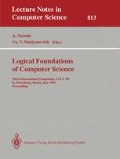Abstract
In this paper we define a framework designed to formalize certain aspects of the behaviour of rational agents. To this end we start by defining a language L in which not only knowledge and actions of a set of agents can be expressed, but also their abilities. A semantics for the language L is defined; a sound and complete axiomatization with regard to the class of models used to define this semantics is given. We define the notion of action transformation, a function that transforms actions into other actions. The semantics that we define is such that two actions that can be transformed into one another have equivalent results and that the abilities of an agent are closed under the action transformations. We also consider the Can-predicate and the Cannot-predicate that formalize the knowledge of agents about the (in)correctness and (un)feasibility of their plans.
This research is partially supported by ESPRIT III BRA project No.6156 ‘DRUMS II’, ESPRIT BRWG project No.8319 ‘MODELAGE’, and the Vrije Universiteit Amsterdam.
This author is partially supported by the Katholieke Universiteit Nijmegen.
Preview
Unable to display preview. Download preview PDF.
References
J. van Benthem. Correspondence theory. In D.M. Gabbay and F. Guenthner, editors, Handbook of Philosophical Logic, volume 2, chapter 4, pages 167–247. D. Reidel, Dordrecht, 1984.
N. Dershowitz and J.-P. Jouannaud. Rewrite systems. In J. van Leeuwen, editor, Handbook of Theoretical Computer Science, volume B, pages 243–320. Elsevier, 1990.
M. Fischer and R. Ladner. The propositional dynamic logic of regular programs. Journal of Computer and System Sciences, 18:194–211, 1979.
R. Goldblatt. Axiomatising the Logic of Computer Programming, volume 130 of Lecture Notes in Computer Science. Springer-Verlag, 1982.
R. Goldblatt. Logics of Time and Computation, volume 7 of CSLI Lecture Notes. CSLI, Stanford, 1992. Second edition.
D. Harel. Dynamic logic. In D.M. Gabbay and F. Guenthner, editors, Handbook of Philosophical Logic, volume 2, chapter 10, pages 497–604. D. Reidel, Dordrecht, 1984.
W. van der Hoek, B. van Linder, and J.-J. Ch. Meyer. A logic of capabilities. Technical Report IR-330, Vrije Universiteit Amsterdam, July 1993.
W. van der Hoek, B. van Linder, and J.-J. Ch. Meyer. Unravelling nondeterminism: On having the ability to choose. Technical Report RUU-CS-93-30, Utrecht University, September 1993.
J.Y. Halpern and Y.O. Moses. A guide to the modal logics of knowledge and belief. In Proc. 9th IJCAI, pages 480–490, 1985.
J. Halpern and J. Reif. The propositional dynamic logic of deterministic, well-structured programs. Theoretical Computer Science, 27:127–165, 1983.
Anthony Kenny. Will, Freedom and Power. Basil Blackwell, Oxford, 1975.
D. Kozen and J. Tiuryn. Logics of programs. In J. van Leeuwen, editor, Handbook of Theoretical Computer Science, volume B, pages 789–840. Elsevier, 1990.
B. van Linder, W. van der Hoek, and J.-J. Ch. Meyer. How to act in case of incomplete information (working title). Manuscript, 1994.
B. van Linder, W. van der Hoek, and J.-J. Ch. Meyer. Tests as epistemic updates: Pursuit of knowledge. Technical Report UU-CS-1994-08, Utrecht University, January 1994.
J.-J. Ch. Meyer and W. van der Hoek. Epistemic logic for AI and computer science. Manuscript.
R.C. Moore. Reasoning about knowledge and action. Technical Report 191, SRI International, 1980.
R.C. Moore. A formal theory of knowledge and action. Technical Report 320, SRI International, 1984.
H.A. Partsch. Specification and Transformation of Programs. Springer Verlag, 1990.
S.R. Thomas. PLACA, An Agent Oriented Programming Language. PhD thesis, Department of Computer Science, Stanford University, Stanford, California 94305, September 1993. Appeared as technical report STAN-CS-93-1487.
Georg Henrik von Wright. Norm and Action. Routledge & Kegan Paul, London, 1963.
Author information
Authors and Affiliations
Editor information
Rights and permissions
Copyright information
© 1994 Springer-Verlag Berlin Heidelberg
About this paper
Cite this paper
van der Hoek, W., van Linder, B., Meyer, J.J.C. (1994). A logic of capabilities. In: Nerode, A., Matiyasevich, Y.V. (eds) Logical Foundations of Computer Science. LFCS 1994. Lecture Notes in Computer Science, vol 813. Springer, Berlin, Heidelberg. https://doi.org/10.1007/3-540-58140-5_34
Download citation
DOI: https://doi.org/10.1007/3-540-58140-5_34
Published:
Publisher Name: Springer, Berlin, Heidelberg
Print ISBN: 978-3-540-58140-6
Online ISBN: 978-3-540-48442-4
eBook Packages: Springer Book Archive

